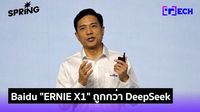Baidu Inc., the major Chinese technology firm, announced the launch of two new artificial intelligence models, Ernie X1 and Ernie 4.5, as it strives to carve out its space amid intense competition from other AI entities like DeepSeek. The announcement came on March 16, 2025, showcasing Baidu's commitment to challenging existing players and enhancing its AI capabilities.
With its eyes set firmly on the market dominated by innovative startups, Baidu has positioned the Ernie X1 model as not just another AI tool but as one capable of competing directly with DeepSeek's R1 model. Baidu claims, "ERNIE X1 has capabilities comparable to DeepSeek R1 at just half the price," indicating both efficiency and cost-effectiveness at the forefront of its design.
Developed with advanced reasoning capabilities, the Ernie X1 is engineered to excel not just at general conversation but also at more complex tasks like logical reasoning and sophisticated analysis. This competitive edge is particularly timely as the AI industry witnesses aggressive innovations.
On the other hand, Baidu's Ernie 4.5, the latest iteration of the foundational AI model, boasts superior multimodal reasoning capabilities. The new model is said to integrate various types of data—text, video, images, and audio—offering comprehensive insights unlike those available from its competitors. Baidu stated, "ERNIE 4.5 has high 'EQ' and can understand memes and satire easily," which signals its intention to pioneer emotional intelligence within AI development.
The introduction of these models demonstrates Baidu's determination not only to catch up with companies like DeepSeek but also to assert itself as a leader in generative AI. The last quarter of 2024 revealed Baidu’s generative AI efforts resulted in substantial growth, with cloud revenue increasing by 26% as they expanded services catering to developers needing more processing power.
Despite its efforts, Baidu acknowledges the uphill battle it faces against rivals, including major firms like OpenAI, which developed ChatGPT, and Alibaba’s open-source models. The company is still grappling with making its Ernie large language model (LLM) widely accepted, even as it claims performance parity with OpenAI's GPT-4 model on several assessments.
Looking forward, Baidu plans to make its Ernie AI model open-source by May 30, 2025, marking a significant shift to attract developer interest and respond to DeepSeek's recent moves. This strategy aligns with industry trends where open-source models are gaining traction among developers and users alike.
The direct comparison of Baidu's Ernie X1 and DeepSeek's R1 could shape the industry dialogue moving forward, especially concerning performance and pricing—critical factors for enterprise adoption.
These advancements not only highlight Baidu's technological progress but also reflect the broader competition within China’s AI sector, where startups and established players alike scramble to innovate and secure market positions. The fast-paced development likely opens up new business opportunities and applications, which could reshape existing market dynamics significantly.
Overall, as Baidu continues to innovate and seeks to standout, industry observers note the importance of its new models, particularly with features like high emotional intelligence, which could redefine user interactions with AI. The future of Baidu's AI development is one to watch closely, as the outcomes may not only impact the company but could also shape the technological advance of artificial intelligence across the globe.





